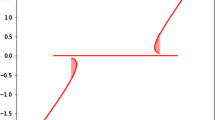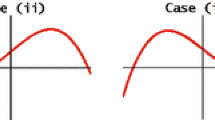Abstract
This paper focuses on the proximal point regularization technique for a class of optimal control processes governed by affine switched systems. We consider switched control systems described by nonlinear ordinary differential equations which are affine in the input. The affine structure of the dynamical models under consideration makes it possible to establish some continuity/approximability properties and to specify these models as convex control systems. We show that, for some classes of cost functionals, the associated optimal control problem (OCP) corresponds to a conventional convex optimization problem in a suitable Hilbert space. The latter can be reliably solved using standard first-order optimization algorithms and consistent regularization schemes. In particular, we propose a conceptual numerical approach based on the gradient-type method and classic proximal point techniques.
Similar content being viewed by others
References
Atkinson K, Han W (2005) Theoretical numerical analysis. Springer, New York
Attia SA, Alamir M, Canudas de Wit C (2005) Suboptimal control of switched nonlinear systems under location and switching constraints. In: Proceedings of the 16th IFAC world congress, Prague, Czech Republick
Attia SA, Azhmyakov V, Raisch J (2010) On an optimization problem for a class of impulsive hybrid systems. Discret Event Dyn Syst 20:215–231
Axelsson H, Boccardo H, Egerstedt M, Valigi M, Wardi Y (2008a) Optimal mode-switching for hybrid systems with varying initial states. Nonlinear Anal: Hybrid Syst 2:765–772
Axelsson H, Wardi Y, Egerstedt M, Verriest EI (2008b) Gradient descent approach to optimal mode scheduling in hybrid dynamical systems. J Optim Theory Appl 136:167–186
Azhmyakov V, Raisch J (2008) Convex control systems and convex optimal control problems with constraints. IEEE Trans Automat Contr 53:993–998
Azhmyakov V, Schmidt WH (2003) Strong convergence of a proximal-based method for convex optimization. Math Methods Oper Res 57:393–407
Azhmyakov V, Attia SA, Raisch J (2008) On the maximum principle for the impulsive hybrid systems. Lecture notes in computer science, vol 4981. Springer, Berlin, pp 30–42
Azhmyakov V, Galvan-Guerra R, Egerstedt M (2009) Hybrid LQ-optimization using dynamic programming. In: Proceedings of the 2009 American control conference, St. Louis, USA, pp 3617–3623
Azhmyakov V, Noriega Morales S (2010) Proximal point method for optimal control processes governed by ordinary differential equations. Asian J Control 12:15–25
Azhmyakov V, Egerstedt M, Fridman L, Poznyak A (2011) Approximability of nonlinear affine control systems. Nonlinear Analysis: Hybrid Systems 5:275–288
Basin M, Calderon-Alvarez D (2009) Optimal controller for uncertain stochastic polynomial systems with deterministic disturbances. Int J Control 82:1435–1447
Basin M, Loukianov A, Hernandez-Fabian R (2011) A sliding mode-like optimal regulator for nonlinear polynomial systems. Int J Syst Sci. doi:10.1080/00207721.2010.545491
Branicky MS, Borkar VS, Mitter SK (1998) A unifed framework for hybrid control: model and optimal control theory. IEEE Trans Automat Contr 43:31–45
Büskens C, Maurer H (2000) SQP-methods for solving optimal control problems with control and state constraints: adjoint variables, sensitivity analysis and real-time control. J Comput Appl Math 120:85–108
Cassandras C, Pepyne DL, Wardi Y (2001) Optimal control of a class of hybrid systems. IEEE Trans Automat Contr 46:398–415
Clarke FH, Yu Ledyaev S, Stern RJ, Wolenski PR (1998) Nonsmooth analysis and control theory. Springer, New York
Ding XC, Wardi Y, Taylor D, Egerstedt M (2008) Optimization of switched-mode systems with switching costs. In: Proceedings of the 2008 American control conference, Seattle, USA, pp 3965–3970
Ding XC, Wardi Y, Egerstedt M (2009) On-line optimization of switched-mode dynamical systems. IEEE Trans Automat Contr 54:2266–2271
Egerstedt M, Wardi Y, Axelsson H (2006) Transition-time optimization for switched-mode dynamical systems. IEEE Trans Automat Contr 51:110–115
Fattorini HO (1999) Infinite dimensional optimization and control theory. Cambridge University Press, Cambridge
Garavello M, Piccoli B (2005) Hybrid necessary priniple. SIAM J Control Optim 43:1867–1887
Göpffert A, Riahi H, Tammer C, Zalinescu C (2003) Variational methods in partially ordered spaces. Springer, New York
Hale J (1969) Ordinary differential equations. Wiley, New York
Hiriart-Urruty JB, Lemarechal C (1993) Convex analysis and minimization algorithms. Springer, Berlin
Ioffe AD, Tichomirov VM (1979) Theory of extremal problems. North Holland, Amsterdam
Isidori A (1989) Nonlinear control systems. Springer, New York
Kaplan A, Tichatschke R (1994) Stable methods for ill-posed variational problems. Akademie Verlag, Berlin
Liberzon D (2003) Switching in systems and control. Birkhauser, Boston
Lygeros J (2003) Lecture notes on hyrid systems. Cambridge University Press, Cambridge
Martinet B (1970) Regularisation d’inequations variationelles par approximations successives, Revue Francaise Informat. Recherche Operationnelle 4:154–159
Maurer H (1976) Numerical solution of singular control problems using multiple shooting techniques. J Optim Theory Appl 18:235–257
Moor T, Raisch J (1999) Supervisory control of hybrid systems within a behavioural framework. Syst Control Lett 38:157–166
Polak E (1997) Optimization. Springer, New York
Poznyak A (2008) Advanced mathematical tools for automatic control engineers. Elsevier, Amsterdam
Rockafellar RT (1970) Convex analysis. Princeton University Press, Princeton
Rockafellar RT (1976) Monotone operators and the proximal point algorithm. SIAM J Control Optim 14:877–898
Sakawa Y, Shindo Y, Hashimoto Y (1981) Optimal control of a rotary crane. J Optim Theory Appl 35:535–557
Shaikh MS, Caines PE (2007) On the hybrid optimal control problem: theory and algorithms. IEEE Trans Automat Contr 52:1587–1603
Solodov MV, Svaiter BF (2000) Forcing strong convergence of proximal point iterations in a Hilbert space. Math Program Ser A 87:189–202
Spellucci P (1993) Numerische Verfahren der Nichtlinearen Optimierung. Birkhäuser, Basel
Sussmann HJ (1999) A maximum principle for hybrid optimization. In: Proceedings of the 38th IEEE conference on decision and control, Phoenix, USA, pp 425–430
Teo KL, Goh CJ, Wong KH (1991) A unifed computational approach to optimal control problems. Wiley, New York
Utkin V (1992) Sliding modes in control and optimization. Springer, Berlin
Verriest E, Delmotte F, Egerstedt M (2004) Optimal impulsive control of point delay systems with refractory period. In: Proceedings of the 5th IFAC workshop on time delay systems, Leuven, Belgium
Xu X, Antsaklis P (2003a) Optimal control of hybrid autonomous systems with state jumps. In: Proceedings of the American control conference, Denver, USA, pp 5191–5196
Xu X, Antsaklis P (2003b) Quadratic optimal control problems for hybrid linear autonomous systems with state jumps. In: Proceedings of the American control conference, Denver, USA, pp 3393–3398
Zukas JA, Walters WP (1998) Explosive effects and applications. Springer, New York
Acknowledgements
The authors thank anonymous referees for valuable remarks and suggestions from which the final version of the paper greatly benefited.
Author information
Authors and Affiliations
Corresponding author
Rights and permissions
About this article
Cite this article
Azhmyakov, V., Basin, M.V. & Raisch, J. A Proximal Point Based Approach to Optimal Control of Affine Switched Systems. Discrete Event Dyn Syst 22, 61–81 (2012). https://doi.org/10.1007/s10626-011-0109-8
Received:
Accepted:
Published:
Issue Date:
DOI: https://doi.org/10.1007/s10626-011-0109-8




